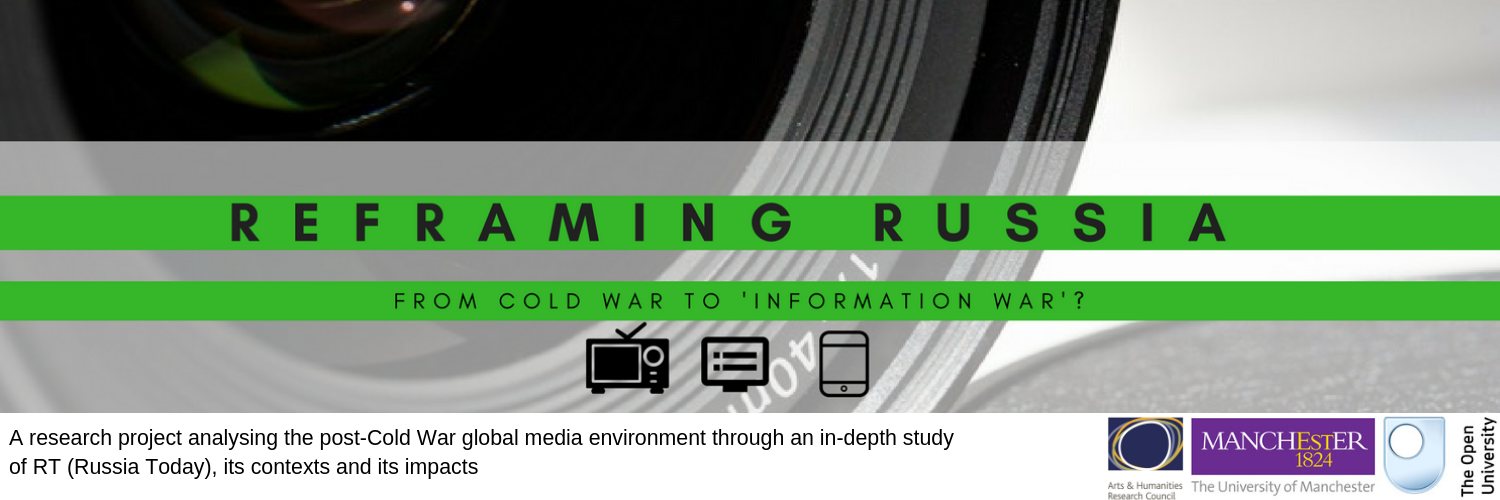‘Reframing Russia for the Global Mediasphere: From Cold War to “Information War”?’ is an Arts and Humanities Research Council funded collaboration between The University of Manchester and The Open University.
The projection of national identities and interests on the global stage is being radically reconfigured by the twin consequences of post-Cold War geopolitical dynamics and transformations in the global news media landscape. The arrival of new players like Russia Today (RT) is altering the international media ecology. RT is Russia’s primary international broadcaster with a reputation for being a mouthpiece of Putin’s regime but the reality is more complex. The mediatization of political conflicts, or the myriad ways in which media like RT not only represent but also intervene and shape conflicts, have significant consequences for peace and security. The proposed research is the first in-depth, comprehensive study of the role of RT in projecting Russia for international audiences. It will be carried out by a multi-disciplinary team of specialists in Russian culture, history, politics as well as experts in media, security and computational linguistics.
The contemporary Russian security-media nexus bears a complex relationship to the history of the Cold War and to Russia’s imperial past but it is poorly researched. Contemporary work on RT has hitherto lacked detailed empirical analysis tied to a robust theoretical framework. It has failed to account for the complexities of current relationships between RT and its very diverse audiences. Understanding the significance of RT in the evolving East-West ‘information war’ is both urgent and necessary to improving international understanding, informed citizenship and finding diplomatic solutions to seemingly intractable conflicts.
This project illuminates the processes by which RT not only reconfigures publics and audiences, but also furnishes the very conditions for unprecedented modes of international mistrust, conflict and insecurity. In integrating historical, discourse analyses, audience and social media research in an innovative methodological framework, we test hypotheses drawn from our pilot research that challenge conventional thinking and presumptions about RT and really get to grips with RT’s recalibration of Russia’s public image for international audiences and its blurring of distinctions between public diplomacy and propaganda.
We address the following core themes and questions:
- Narration: how do RT’s narratives of Russian nationhood, and its narrational strategies echo and transform those of the Soviet/imperial past?
- Legitimation: how are state agendas legitimated?
- Adaptation: how are domestic news narratives adapted for RT’s international audiences?
- Identities: how are ‘grammars of identity’ and othering represented in RT’s outputs and with what implications for exacerbating an ‘information war’ and amplifying securitisation processes?
- Engagement: how do audiences and users engage with RT’s broadcast news and social media content?
We research the above processes through case studies of three kinds of ‘media events’: (1) pre-planned Russian media-state collaborations; (2) on-going political conflicts; (3) unexpected, disruptive security-related events.
Our outputs include academic articles, conference presentations and a co-authored monograph (forthcoming). We have also shared the findings from our project with a wide range of media organisations, the UK Parliament and the Foreign and Commonwealth Office.
We brought journalists, policy makers and academics into dialogue via several workshops, demonstrating the significance of Arts and Humanities research for studying the relationship between media, identity and international security.
Read our latest news and blog posts, and learn more about the members of our team.
